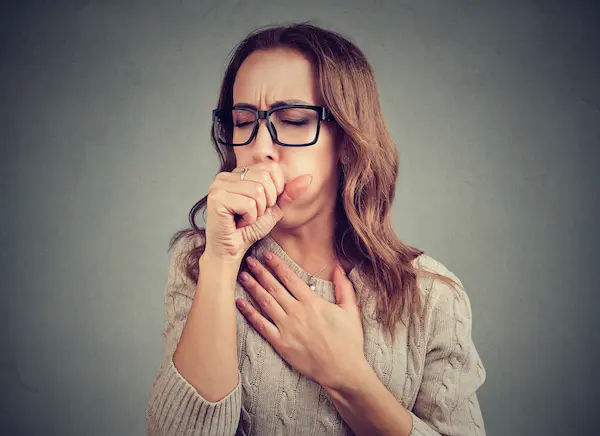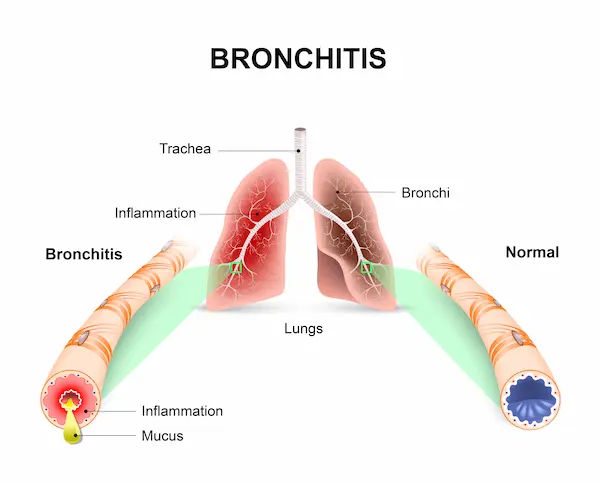Bronchitis: Symptoms, Causes, Diagnosis, and Treatment
Explore bronchitis, including its symptoms, causes, diagnosis methods, and treatment options. Learn how to manage both acute and chronic bronchitis for better respiratory health.

Written by Dr. Rohinipriyanka Pondugula
Reviewed by Dr. Shaik Abdul Kalam MD (Physician)
Last updated on 26th Aug, 2025

Bronchitis is a common respiratory condition that affects millions of people every year. If you or a loved one has been diagnosed with bronchitis, you might have questions about what it is, how it affects your health, and what you can do to recover. This article will help you understand bronchitis in simple terms, covering its symptoms, causes, diagnosis, and treatment options.
What Is Bronchitis?
Bronchitis occurs when the bronchial tubes, the airways that carry air to your lungs become inflamed and produce excess mucus. This inflammation can make breathing difficult and cause a persistent cough. There are two main types of bronchitis:
1. Acute Bronchitis – Usually caused by a viral infection (like the common cold or flu) and lasts for a few weeks.
2. Chronic Bronchitis – A long-term condition often linked to smoking or prolonged exposure to irritants like air pollution.
Consult a Top Pulmonologist
Symptoms of Bronchitis
The symptoms of bronchitis can vary depending on whether it is acute or chronic. Common signs include:
- Persistent cough (with or without mucus)
- Wheezing or a whistling sound while breathing
- Chest discomfort or tightness
- Shortness of breath
- Fatigue
- Mild fever and chills (more common in acute bronchitis)
If your cough lasts more than three weeks, you have a high fever, or you cough up blood, you should see a doctor immediately.
What Causes Bronchitis?
Below are the possible causes of bronchitis,
1. Acute Bronchitis Causes
- Viral infections (most common cause, such as cold or flu viruses)
- Bacterial infections (less common)
- Exposure to irritants (dust, smoke, fumes)
2. Chronic Bronchitis Causes
- Smoking (primary cause)
- Long-term exposure to air pollution, chemical fumes, or dust
- Recurrent respiratory infections
How Is Bronchitis Diagnosed?
If you suspect bronchitis, a doctor will:
1. Ask about your symptoms and medical history.
2. Listen to your lungs with a stethoscope for abnormal sounds.
3. Order tests if needed, such as:
- Chest X-ray (to rule out pneumonia)
- Sputum test (to check for bacterial infection)
- Pulmonary function test (for chronic bronchitis)
Get Your Health Assessed
Treatment for Bronchitis
Below are the different types of treatment for bronchitis,
1. Acute Bronchitis Treatment
Since most cases are viral, antibiotics won’t help. Instead, treatment focuses on relieving symptoms:
- Rest and hydration (drink plenty of fluids)
- Over-the-counter pain relievers (like ibuprofen or acetaminophen)
- Cough suppressants (if the cough is dry)
- Humidifiers or steam inhalation (to ease breathing)
2. Chronic Bronchitis Treatment
This requires long-term management:
- Quit smoking (the most important step)
- Bronchodilators or inhalers (to open airways)
- Pulmonary rehabilitation (breathing exercises)
- Oxygen therapy (in severe cases)
Lifestyle and Home Remedies
Here are some ways to manage bronchitis and prevent flare-ups:
- Avoid smoking and secondhand smoke
- Wear a mask in polluted or dusty environments
- Wash hands frequently to prevent infections
- Get vaccinated (flu and pneumonia shots help)
- Use a humidifier to keep air moist
When to See a Doctor?
Consult a doctor if:
- Your cough lasts more than 3 weeks
- You have high fever or difficulty breathing
- You cough up blood
- You have underlying heart or lung disease
If you’re experiencing severe symptoms, you can book a consultation with a pulmonologist through Apollo 24|7 for expert advice and care.
Final Thoughts
Bronchitis can be uncomfortable, but most cases improve with rest and proper care. If you have chronic bronchitis, lifestyle changes like quitting smoking can make a big difference. Always listen to your body and seek medical help if symptoms worsen.
Consult a Top Pulmonologist
Consult a Top Pulmonologist

Dr Harshitha Degapoodi
Pulmonology Respiratory Medicine Specialist
1 Years • MBBS , MD Pulmonary Medicine .
Hyderabad
Apollo Hospitals D R D O kanchanbagh, Hyderabad

Dr. Sumara Maqbool
Pulmonology Respiratory Medicine Specialist
12 Years • MBBS, DNB Respiratory, critical care and sleep medicine, DrNB superspeciality Critical care, IDCCM, IFCCM, EDIC
Delhi
Apollo Hospitals Indraprastha, Delhi
(25+ Patients)

Dr. Nikhil Modi
Pulmonology Respiratory Medicine Specialist
15 Years • MBBS, MD, FCCP, EDARM, IDCCM
Delhi
Apollo Hospitals Indraprastha, Delhi
(225+ Patients)

Dr. Khushboo Saxena
Pulmonology Respiratory Medicine Specialist
10 Years • MBBS,DNB(Pul. Med), FCCP(USA), FSM(ISDA), MNAMS
Bhopal
Apollo Sage Hospitals, Bhopal

Dr Shubham Agarwal
Pulmonology Respiratory Medicine Specialist
4 Years • MBBS (Gold Medal) MD, DM (Pulmonary, Critical Care and Sleep Medicine), DNB (Medicine) , MRCP (UK), EDARM,
Lucknow
Apollomedics Super Speciality Hospital, Lucknow
Consult a Top Pulmonologist

Dr Harshitha Degapoodi
Pulmonology Respiratory Medicine Specialist
1 Years • MBBS , MD Pulmonary Medicine .
Hyderabad
Apollo Hospitals D R D O kanchanbagh, Hyderabad

Dr. Sumara Maqbool
Pulmonology Respiratory Medicine Specialist
12 Years • MBBS, DNB Respiratory, critical care and sleep medicine, DrNB superspeciality Critical care, IDCCM, IFCCM, EDIC
Delhi
Apollo Hospitals Indraprastha, Delhi
(25+ Patients)

Dr. Nikhil Modi
Pulmonology Respiratory Medicine Specialist
15 Years • MBBS, MD, FCCP, EDARM, IDCCM
Delhi
Apollo Hospitals Indraprastha, Delhi
(225+ Patients)

Dr. Khushboo Saxena
Pulmonology Respiratory Medicine Specialist
10 Years • MBBS,DNB(Pul. Med), FCCP(USA), FSM(ISDA), MNAMS
Bhopal
Apollo Sage Hospitals, Bhopal

Dr Shubham Agarwal
Pulmonology Respiratory Medicine Specialist
4 Years • MBBS (Gold Medal) MD, DM (Pulmonary, Critical Care and Sleep Medicine), DNB (Medicine) , MRCP (UK), EDARM,
Lucknow
Apollomedics Super Speciality Hospital, Lucknow





